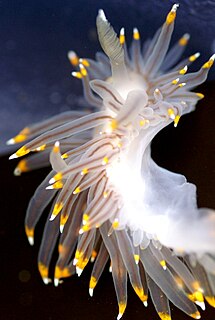Related Research Articles

Neritoidea is a taxonomic superfamily of mostly sea snails, nerites and their allies, marine gastropod mollusks in the order Cycloneritida.
The taxonomy of the Gastropoda as it was revised in 2005 by Philippe Bouchet and Jean-Pierre Rocroi is a system for the scientific classification of gastropod mollusks. The paper setting out this taxonomy was published in the journal Malacologia. The system encompasses both living and extinct groups, as well as some fossils whose classification as gastropods is uncertain.

Pyramidelloidea is a superfamily of mostly very small sea snails, marine gastropod mollusks and micromollusks within the clade Panpulmonata.

Lower Heterobranchia, also known as the Allogastropoda, is a group of rather specialized, highly evolved sea slugs and sea snails, within the subclass Heterobranchia.

Acochlidiacea, common name acochlidians, are a taxonomic clade of very unusual sea snails and sea and freshwater slugs, aquatic gastropod mollusks within the large clade Heterobranchia. Acochlidia is a variant spelling.

The limacoidei is a taxonomic infraorder of air-breathing land snails, semislugs and slugs, terrestrial pulmonate gastropod molluscs in the suborder Helicina

The Dexiarchia are a suborder of sea slugs, shell-less marine gastropod molluscs in the order Nudibranchia. This classification is based on the study by Schrödl et al., published in 2001, who recognized within this clade two clades Pseudoeuctenidiacea and Cladobranchia.

Umbraculoidea is a superfamily of unusual false limpets with a thin soft patelliform shell, marine gastropod molluscs in the clade Umbraculida, within the clade Euopisthobranchia.

According to the taxonomy of Bouchet & Rocroi (2005), Strubellioidea was a taxonomic superfamily of sea slugs, mostly marine gastropod mollusks within the informal group Opisthobranchia.
Runcinoidea is a taxonomic superfamily or a clade Runcinaecea of sea slugs, marine gastropod mollusks in the clade Euopisthobranchia.

Acochlidiidae are a taxonomic family of shell-less freshwater gastropods, aquatic gastropod mollusks within the clade Acochlidiacea.
Hedylopsis is a genus of sea slugs, marine gastropod mollusks within the clade Acochlidiacea.
Asperspina is a genus of sea slugs, marine gastropod mollusks within the clade Acochlidiacea.

Microhedylidae are a taxonomic family of sea slugs, marine gastropod mollusks within the clade Acochlidiacea.
Tantulum elegans is a species of freshwater slug, an aquatic shell-less gastropod mollusk within the clade Acochlidiacea.
Strubellia paradoxa is a species of freshwater slug, a shell-less freshwater gastropod, an aquatic gastropod mollusk within the clade Acochlidiacea.

Colloniidae is a family of small sea snails with calcareous opercula, marine gastropod mollusks in the clade Vetigastropoda.
This overview lists proposed changes in the taxonomy of gastropods at the family level and above since 2005, when the taxonomy of the Gastropoda by Bouchet & Rocroi (2005) was published. In other words, these are recent updates in the way various groups of snails and slugs are classified.

Pseudunela is a genus of minute sea slugs, acochlidians, shell-less marine or temporary brackish or brackish gastropod mollusks in the clade Acochlidiacea.
Aiteng is a genus of two species of sea slugs, marine gastropod molluscs and one terrestrial species. Aiteng is the only genus in the family Aitengidae. The generic name Aiteng is derived from the name of a black puppet Ai Theng, which is one of the shadow play puppets in southern Thailand.
References
- 1 2 3 Bouchet, Philippe; Rocroi, Jean-Pierre; Frýda, Jiri; Hausdorf, Bernard; Ponder, Winston; Valdés, Ángel & Warén, Anders (2005). "Classification and nomenclator of gastropod families". Malacologia . Hackenheim, Germany: ConchBooks. 47 (1–2): 1–397. ISBN 3-925919-72-4. ISSN 0076-2997.
- ↑ Schrödl M. & Neusser T. P. (2010). "Towards a phylogeny and evolution of Acochlidia (Mollusca: Gastropoda: Opisthobranchia)". Zoological Journal of the Linnean Society 158: 124-154. doi : 10.1111/j.1096-3642.2009.00544.x.